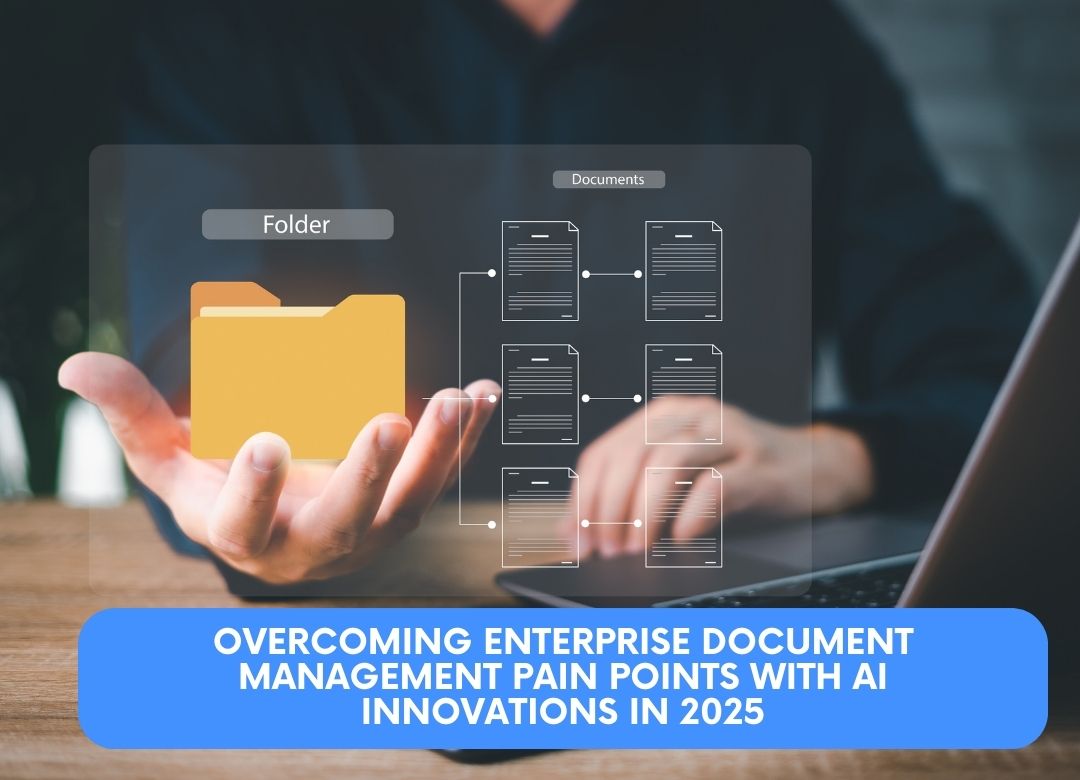Introduction
In the rapidly evolving digital landscape of 2025, enterprises are overwhelmed by a tidal wave of documents like contracts, compliance records, invoices & customer data. A recent industry survey indicates that approximately 65% of employees experience productivity setbacks due to disorganized digital systems, translating to significant time and cost losses. With the content management market poised to reach $31 billion by 2028, propelled by AI and advanced data frameworks, businesses are seeking smarter ways to manage their information.
Traditional document management systems (DMS) frequently face challenges, such as difficult integrations, vulnerabilities in security and limitations in scaling. Fortunately, artificial intelligence (AI) is redefining the field, offering automation, enhanced security and adaptive scalability. This article delves into the key challenges enterprises face in document management, explores how AI provides effective solutions, and outlines future trends shaping this domain.
Common Pain Points in Enterprise Document Management
Complex Implementation: Migrating to a new DMS demands extensive IT resources and training, often causing operational disruptions lasting weeks or months.
Integration Challenges: Merging outdated systems with newer platforms often leads to fragmented data silos and complications in managing versions
Inefficient Search: Around 50% of workers lose 2.5 hours weekly searching for documents due to inadequate indexing.
Security Vulnerabilities: Manual or poorly secured systems heighten the risk of data breaches, potentially leading to hefty compliance penalties.
Workflow Challenges: Manual operations often create delays, lead to scope creep and drain employees who must handle several different tools
Scalability Constraints: On-premise setups limit growth due to hardware limits, while cloud transitions risk downtime and data sovereignty challenges.
How AI is Transforming Document Management
Task Automation: AI streamlines sorting, tagging and filing, with allowing staff to focus on strategic priorities.
Smart Search Capabilities: Natural language processing (NLP) enables precise document retrieval from vast repositories.
Flexible Deployments: Cloud and hybrid models provide scalability alongside data control options.
Error Minimization: AI reduces mistakes in critical documents, potentially saving up to 30% in processing time.
Predictive Analytics: AI forecasts workflow bottlenecks, driving efficiency improvements.
Advanced Security: AI-powered anomaly detection and encryption ensure adherence to regulations like GDPR and HIPAA.
Accessible Customization: Low-code/no-code platforms empower non-technical users to design workflows.
AI-Powered Search: AI powered content search works by semantic understanding and intent recognition to deliver highly relevant results, even without exact keywords.
Addressing Implementation Complexity with AI
Implementing a new DMS can be daunting, but AI simplifies the process. Automated migration tools transfer data from legacy systems with minimal disruption, while intuitive interfaces reduce the learning curve. Comprehensive onboarding ensures teams adapt quickly, cutting down implementation timelines from months to weeks. AI also supports phased rollouts, allowing businesses to integrate new features incrementally, minimizing operational impact.
Enhancing Integration and Search Efficiency
AI bridges the gap between disparate systems by enabling seamless integration with ERP, CRM software and productivity tools. Custom APIs and no-code platforms allow organizations to connect legacy software without extensive coding, eliminating data silos. For search efficiency, AI-driven contextual search uses NLP to understand query intent, delivering accurate results even in large datasets. Automated tagging further organizes documents, reducing search time by up to 40% and enhancing collaboration across teams.
Strengthening Security and Compliance
Security always remains as a top priority and AI fortifies it with end-to-end encryption and real-time anomaly detection. These features identify potential breaches before they escalate, ensuring compliance with global standards like GDPR and HIPAA. In hybrid environments, Artificial Intelligence allows sensitive data to remain on-premises while leveraging cloud resources for analytics, balancing control and accessibility. Audit trails and blockchain integration further enhance document integrity, providing a robust defense against compliance risks.
Automating Workflows for Efficiency
Manual workflows are a significant bottleneck, but AI automates repetitive tasks like approvals and routing. Predictive analytics identifies inefficiencies, suggesting optimizations that reduce processing times. By automating document lifecycle management—from creation to archival—AI minimizes human error and accelerates decision-making. This is particularly valuable in industries like finance and healthcare, where timely document handling is critical.
Ensuring Scalability for Growth
As businesses expand, scalability becomes essential. AI-powered cloud and hybrid deployments allow organizations to scale resources dynamically, accommodating spikes in document volume during audits or expansions. Multi-cloud strategies enhance redundancy and performance, while pay-as-you-go models prevent overprovisioning. This flexibility ensures enterprises can grow without the constraints of traditional on-premise systems, adapting to global demands with ease.
A Real-World Case Study: AI in Action
Consider a mid-sized healthcare provider struggling with patient record management. Manual processes led to delays in compliance reporting, and integration with existing systems was inconsistent. By adopting an AI-enhanced DMS, the provider automated record classification, cutting processing time by 50%. AI security features detected a potential breach early, ensuring HIPAA compliance. Seamless integration with their CRM improved patient data access, while scalable cloud resources handled a surge during a health campaign, demonstrating AI’s practical impact.
Future Trends Shaping AI Document Management
Cloud-First Approach: Enterprises increasingly prioritize cloud solutions for flexibility.
Ethical AI Focus: Emphasis on transparency and bias mitigation aligns with future regulations.
Quantum Integration: Emerging tech like quantum computing promises faster data processing.
Mobile Accessibility: Mobile-first designs enhance remote collaboration.
Sustainability: Energy-efficient AI models support eco-friendly operations.
These trends indicate a shift toward intelligent, adaptable systems that prioritize user experience and environmental impact, setting the stage for long-term innovation.
Conclusion
In 2025, AI is revolutionizing enterprise document management by addressing implementation, integration, security, workflow, and scalability challenges. By automating tasks, enhancing search capabilities, and ensuring compliance, AI transforms document management into a strategic asset. Businesses can leverage these advancements to boost efficiency and stay competitive. For a deeper dive into AI-driven document management solutions, explore idoks.ai.

Sandeep Kumar is the Founder & CEO of Aitude, a leading AI tools, research, and tutorial platform dedicated to empowering learners, researchers, and innovators. Under his leadership, Aitude has become a go-to resource for those seeking the latest in artificial intelligence, machine learning, computer vision, and development strategies.


